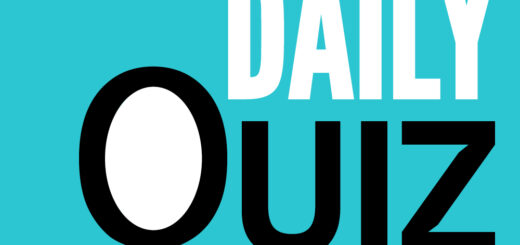Daily Quiz: 4th June 2019
1. Which of the following statements are true:
1. Organisation of Islamic Cooperation is the 2nd largest inter-governmental organisation in the world after the UN, with a membership of 57 states in 7 continents.
2. India is neither a member nor an observer.
(a) 1 only
(b) 2 only
(c) Both 1 and 2
(d) Neither 1 nor 2
Ans:b
Justification:
- The OIC describes itself as “the collective voice of the Muslim world”.Its objective is to safeguard and protect the interests of the Muslim world.
- It is the 2nd largest inter-governmental organisation in the world after the UN, with a membership of 57 states in 4 continents.
- It has reserved its membership for Muslim-majority countries.Russia, Thailand, and couple of other small countries have Observer status.
- India is neither a member nor an observer.
2. Which of the following is not a QUAD country?
(a) India
(b) Australia
(c) USA
(d) Brazil
Ans: d
Justification:
- The Quadrilateral Security Dialogue also known as Quad is an informal strategic grouping consisting of India, US, Australia and Japan.
3. Which of the following statements are not true?
(a) Nipah virus infection is a newly emerging zoonosis, that is, a disease transmitted from animals to humans.
(b) The natural host of the virus are fruit bats belonging to the family Pteropodidae.
(c) Pigs can also act as intermediate hosts.
(d) WHO has approved new vaccine for Nipah
Ans:d
Justification:
- According to WHO, the Nipah virus infection is a newly emerging zoonosis, that is, a disease transmitted from animals to humans. The virus belongs to a new genus termed Henipavirus (subfamily Paramyxovirinae).
- The natural host of the virus are fruit bats belonging to the family Pteropodidae. In 2004, humans were affected after eating the date palm contaminated by infected fruit bats. Pigs can also act as intermediate hosts.
- Currently, there are no vaccines for both humans and animals. Intensive supportive care is given to humans infected by Nipah virus
4. Which of the following statements are true:
1. National Investigation Agency (NIA), which is governed by its own NIA Act and has jurisdiction across the country.
2. The CBI is governed by the Delhi Special Police Establishment Act that makes consent of a state government mandatory for conducting investigation in that state.
(a) 1 only
(b) 2 only
(c) Both 1 and 2
(d) Neither 1 nor 2
Ans:c
Justification:
- Unlike the National Investigation Agency (NIA), which is governed by its own NIA Act and has jurisdiction across the country, the CBI is governed by the Delhi Special Police Establishment Act that makes consent of a state government mandatory for conducting investigation in that state.
5. Which of the following statements are not true?
(a) Siachen Glacier is among of the largest glaciers in the non-polar region of the world.
(b) It lies in the Pirpanjal Range system which is a part of western Himalayas.
(c) It also lies to the south of the zone that separates Eurasion Plate with the Indian Plate, which is the result of convergence boundary interaction in geographical terms.
(d) It is the highest battle field in the world and lies on LoC (Line of Control) between India and Pakistan.
Answer: b
Justification:
- Siachen Glacier is among of the largest glaciers in the non-polar region of the world.
- It lies in the Karakoram Range system which is a part of western Himalayas.
- It also lies to the south of the zone that separates Eurasion Plate with the Indian Plate, which is the result of convergence boundary interaction in geographical terms.
- The word Siachen comes out of two words: “Sia” which means rose and “Chun” which means anything found in abundance according to “Balti” language. Therefore it represents the place of roses.
- It is the highest battle field in the world and lies on LoC (Line of Control) between India and Pakistan. It has been continuously contested by Pakistan as its own part which has led to militarisation of the glacier.
- After the Indo-Pakistan war in 1971, an agreement was signed between the two countries in 1972, which came to be known as the Shimla Agreement, but it failed to clearly mention who controls the glacier.
- However, in 1984, the Pakistan army tried to enter the glacier, forcing India to launch a military operation known as “Operation Meghdoot” and since then we have control over the glacier. Frequent skirmishes did occur between 1884 to 2003. A ceasefire agreement was signed between India and Pakistan in 2003













